This list shows the IUCN Red List status of the 120 mammal species occurring in Metropolitan France. One of them is critically endangered, two are endangered, thirteen are vulnerable, and four are near threatened. One of the species listed for France is considered to be extinct.
The following tags are used to highlight each species' conservation status as assessed on the respective IUCN Red Lists published by the International Union for Conservation of Nature:
| EX | Extinct | No reasonable doubt that the last individual has died. |
| EW | Extinct in the wild | Known only to survive in captivity or as a naturalized populations well outside its previous range. |
| CR | Critically endangered | The species is in imminent risk of extinction in the wild. |
| EN | Endangered | The species is facing an extremely high risk of extinction in the wild. |
| VU | Vulnerable | The species is facing a high risk of extinction in the wild. |
| NT | Near threatened | The species does not meet any of the criteria that would categorise it as risking extinction but it is likely to do so in the future. |
| LC | Least concern | There are no current identifiable risks to the species. |
| DD | Data deficient | There is inadequate information to make an assessment of the risks to this species. |
Order: Rodentia (rodents)


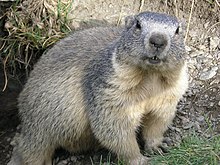
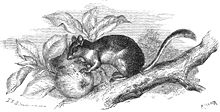

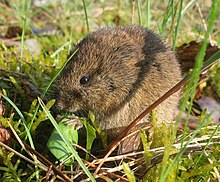

Rodents make up the largest order of mammals, with over 40% of mammalian species. They have two incisors in the upper and lower jaw which grow continually and must be kept short by gnawing. Most rodents are small though the capybara can weigh up to 45 kg (99 lb).
- Suborder: Sciurognathi
- Family: Castoridae (beavers)
- Genus: Castor
- Eurasian beaver, C. fiber LC
- North American beaver, C. canadensis LC introduced, extirpated
- Genus: Castor
- Family: Sciuridae (squirrels)
- Subfamily: Sciurinae
- Genus: Sciurus
- Red squirrel, S. vulgaris LC
- Genus: Sciurus
- Subfamily: Xerinae
- Genus: Marmota
- Alpine marmot, M. marmota LC
- Genus: Marmota
- Subfamily: Sciurinae
- Family: Gliridae (dormice)
- Subfamily: Leithiinae
- Genus: Eliomys
- Garden dormouse, E. quercinus NT
- Genus: Muscardinus
- Hazel dormouse, M. avellanarius LC
- Genus: Eliomys
- Subfamily: Glirinae
- Genus: Glis
- European edible dormouse, G. glis LC
- Genus: Glis
- Subfamily: Leithiinae
- Family: Cricetidae
- Subfamily: Cricetinae
- Genus: Cricetus
- European hamster, C. cricetus CR
- Genus: Cricetus
- Subfamily: Arvicolinae
- Genus: Arvicola
- European water vole, A. amphibius LC
- Southwestern water vole, A. sapidus VU
- Genus: Chionomys
- Snow vole, C. nivalis LC
- Genus: Clethrionomys
- Bank vole, C. glareolus LC
- Genus: Microtus
- Field vole, M. agrestis LC
- Common vole, M. arvalis LC
- Cabrera's vole, M. cabrerae NT
- Mediterranean pine vole, M. duodecimcostatus LC
- Gerbe's vole, M. gerbei LC
- Lusitanian pine vole, M. lusitanicus LC
- Alpine pine vole, M. multiplex LC
- Savi's pine vole, M. savii LC
- European pine vole, M. subterraneus LC
- Genus: Arvicola
- Subfamily: Cricetinae
- Family: Muridae (mice, rats, voles, gerbils, hamsters, etc.)
- Subfamily: Murinae
- Genus: Mus
- House mouse, M. musculus LC
- Algerian mouse, M. spretus LC
- Genus: Apodemus
- Alpine field mouse, A. alpicola LC
- Yellow-necked mouse, A. flavicollis LC
- Wood mouse, A. sylvaticus LC
- Genus: Micromys
- Eurasian harvest mouse, M. minutus LC
- Genus: Rattus
- Genus: Mus
- Subfamily: Murinae
- Family: Castoridae (beavers)
Order: Lagomorpha (lagomorphs)

The lagomorphs comprise two families, Leporidae (hares and rabbits), and Ochotonidae (pikas). Though they can resemble rodents, and were classified as a superfamily in that order until the early 20th century, they have since been considered a separate order. They differ from rodents in a number of physical characteristics, such as having four incisors in the upper jaw rather than two.
- Family: Leporidae (rabbits, hares)
- Genus: Lepus
- Corsican hare, L. corsicanus VU
- European hare, L. europaeus LC
- Mountain hare, L. timidus LC
- Genus: Oryctolagus
- European rabbit, O. cuniculus EN
- Genus: Lepus
- Family: Ochotonidae (pikas)
- Genus: Prolagus
- Sardinian pika, P. sardus EX
- Genus: Prolagus
Order: Eulipotyphla (shrews, hedgehogs, gymnures, moles and solenodons)

Eulipotyphlans are insectivorous mammals. Shrews and solenodons resemble mice, hedgehogs carry spines, gymnures look more like large rats, while moles are stout-bodied burrowers.
- Family: Erinaceidae (hedgehogs and gymnures)
- Subfamily: Erinaceinae
- Genus: Atelerix
- North African hedgehog, A. algirus LC extirpated
- Genus: Erinaceus
- West European hedgehog, E. europaeus LC
- Genus: Atelerix
- Subfamily: Erinaceinae


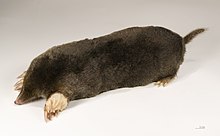
- Family: Soricidae (shrews)
- Subfamily: Crocidurinae
- Genus: Crocidura
- Bicolored shrew, C. leucodon LC
- Greater white-toothed shrew, C. russula LC
- Lesser white-toothed shrew, C. suaveolens LC
- Genus: Suncus
- Etruscan shrew, S. etruscus LC
- Genus: Crocidura
- Subfamily: Soricinae
- Tribe: Nectogalini
- Genus: Neomys
- Southern water shrew, N. anomalus LC
- Eurasian water shrew, N. fodiens LC
- Genus: Neomys
- Tribe: Soricini
- Genus: Sorex
- Alpine shrew, S. alpinus LC
- Common shrew, S. araneus LC
- Crowned shrew, S. coronatus LC
- Eurasian pygmy shrew, S. minutus LC
- Genus: Sorex
- Tribe: Nectogalini
- Subfamily: Crocidurinae
- Family: Talpidae (moles)
- Subfamily: Talpinae
- Tribe: Desmanini
- Genus: Galemys
- Pyrenean desman, G. pyrenaicus VU
- Genus: Galemys
- Tribe: Talpini
- Genus: Talpa
- Mediterranean mole, T. caeca LC
- European mole, T. europaea LC
- Roman mole, T. romana LC
- Genus: Talpa
- Tribe: Desmanini
- Subfamily: Talpinae
Order: Chiroptera (bats)

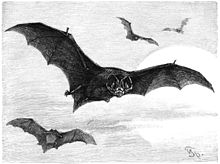



The bats' most distinguishing feature is that their forelimbs are developed as wings, making them the only mammals capable of flight. Bat species account for about 20% of all mammals.
- Family: Vespertilionidae
- Subfamily: Myotinae
- Genus: Myotis
- Bechstein's bat, M. bechsteini NT
- Lesser mouse-eared bat, M. blythii LC
- Brandt's bat, M. brandti LC
- Long-fingered bat, M. capaccinii VU
- Cryptic myotis, M. crypticus
- Pond bat, M. dasycneme NT
- Daubenton's bat, M. daubentonii LC
- Geoffroy's bat, M. emarginatus LC
- Escalera's bat, M. escalerai LC
- Greater mouse-eared bat, M. myotis LC
- Whiskered bat, M. mystacinus LC
- Natterer's bat, M. nattereri LC
- Genus: Myotis
- Subfamily: Vespertilioninae
- Genus: Barbastella
- Western barbastelle, B. barbastellus NT
- Genus: Eptesicus
- Northern bat, E. nilssoni LC
- Serotine bat, E. serotinus LC
- Genus: Hypsugo
- Savi's pipistrelle, H. savii LC
- Genus: Nyctalus
- Greater noctule bat, N. lasiopterus NT
- Lesser noctule, N. leisleri LC
- Common noctule, N. noctula LC
- Genus: Pipistrellus
- Kuhl's pipistrelle, P. kuhlii LC
- Nathusius' pipistrelle, P. nathusii LC
- Common pipistrelle, P. pipistrellus LC
- Genus: Plecotus
- Brown long-eared bat, P. auritus LC
- Grey long-eared bat, P. austriacus NT
- Genus: Vespertilio
- Parti-coloured bat, V. murinus LC
- Genus: Barbastella
- Subfamily: Miniopterinae
- Genus: Miniopterus
- Common bent-wing bat, M. schreibersii VU
- Genus: Miniopterus
- Subfamily: Myotinae
- Family: Molossidae
- Genus: Tadarida
- European free-tailed bat, T. teniotis LC
- Genus: Tadarida
- Family: Rhinolophidae
- Subfamily: Rhinolophinae
- Genus: Rhinolophus
- Mediterranean horseshoe bat, R. euryale NT
- Greater horseshoe bat, R. ferrumequinum LC
- Lesser horseshoe bat, R. hipposideros LC
- Mehely's horseshoe bat, R. mehelyi VU
- Genus: Rhinolophus
- Subfamily: Rhinolophinae
Order: Cetacea (whales)





The order Cetacea includes whales, dolphins and porpoises. They are the mammals most fully adapted to aquatic life with a spindle-shaped nearly hairless body, protected by a thick layer of blubber, and forelimbs and tail modified to provide propulsion underwater.
- Suborder: Mysticeti
- Family: Balaenidae (right whales)
- Genus: Balaena
- Bowhead whale, Balaena mysticetus LC vagrant
- Genus: Eubalaena
- North Atlantic right whale, Eubalaena glacialis CR or functionally extinct in European waters
- Genus: Balaena
- Family: Balaenopteridae (rorquals)
- Subfamily: Megapterinae
- Genus: Megaptera
- Humpback whale, Megaptera novaeangliae LC
- Genus: Megaptera
- Subfamily: Balaenopterinae
- Genus: Balaenoptera
- Fin whale, Balaenoptera physalus EN
- Minke whale, Balaenoptera acutorostrata NT
- Genus: Balaenoptera
- Subfamily: Megapterinae
- Family: Balaenidae (right whales)
- Suborder: Odontoceti
- Family: Kogiidae
- Genus: Kogia
- Pygmy sperm whale, Kogia breviceps LC
- Genus: Kogia
- Family: Ziphidae (beaked whales)
- Genus: Ziphius
- Cuvier's beaked whale, Ziphius cavirostris DD
- Subfamily: Hyperoodontidae
- Genus: Hyperoodon
- Northern bottlenose whale, Hyperoodon ampullatus DD
- Genus: Mesoplodon
- Sowerby's beaked whale, Mesoplodon bidens DD
- True's beaked whale, Mesoplodon mirus DD
- Genus: Hyperoodon
- Genus: Ziphius
- Family: Phocoenidae (porpoises)
- Genus: Phocoena
- Harbour porpoise, Phocoena phocoena VU
- Genus: Phocoena
- Family: Delphinidae (marine dolphins)
- Genus: Lagenorhynchus
- White-beaked dolphin, Lagenorhynchus albirostris LC
- Genus: Leucopleurus
- Atlantic white-sided dolphin, Leucopleurus acutus LC
- Genus: Steno
- Rough-toothed dolphin, Steno bredanensis DD
- Genus: Tursiops
- Bottlenose dolphin, Tursiops truncatus DD
- Genus: Stenella
- Striped dolphin, Stenella coeruleoalba LC
- Genus: Delphinus
- Short-beaked common dolphin, Delphinus delphis LC
- Genus: Grampus
- Risso's dolphin, Grampus griseus DD
- Genus: Feresa
- Pygmy killer whale, Feresa attenuata DD
- Genus: Pseudorca
- False killer whale, Pseudorca crassidens LC
- Genus: Globicephala
- Pilot whale, Globicephala melas LC
- Genus: Orcinus
- Orca, Orcinus orca DD
- Genus: Lagenorhynchus
- Superfamily: Platanistoidea
- Family: Monodontidae
- Genus: Delphinapterus
- Beluga, Delphinapterus leucas VU
- Genus: Delphinapterus
- Family: Monodontidae
- Family: Kogiidae
Order: Carnivora (carnivorans)

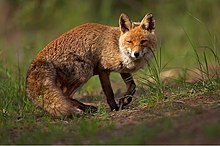


There are over 260 species of carnivorans, the majority of which feed primarily on meat. They have a characteristic skull shape and dentition.
- Suborder: Feliformia
- Family: Felidae (cats)
- Subfamily: Felinae
- Genus: Felis
- European wildcat, F. silvestris LC
- Genus: Lynx
- Eurasian lynx, L. lynx LC
- Iberian lynx, L. pardinus EN extirpated
- Genus: Felis
- Subfamily: Felinae
- Family: Viverridae
- Subfamily: Viverrinae
- Genus: Genetta
- Common genet, G. genetta LC introduced
- Genus: Genetta
- Subfamily: Viverrinae
- Family: Felidae (cats)
- Suborder: Caniformia
- Family: Canidae (dogs, foxes)
- Genus: Canis
- Golden jackal, C. aureus LC vagrant
- Gray wolf, C. lupus LC
- Italian wolf, C. l. italicus
- Eurasian wolf, C. l. lupus
- Genus: Nyctereutes
- Raccoon dog, N. procyonoides LC introduced
- Genus: Vulpes
- Red fox, V. vulpes LC
- Genus: Canis
- Family: Ursidae (bears)
- Genus: Ursus
- Brown bear, U. arctos LC
- Eurasian brown bear, U. a. arctos
- Brown bear, U. arctos LC
- Genus: Ursus
- Family: Mustelidae (mustelids)
- Genus: Lutra
- European otter, L. lutra NT
- Genus: Martes
- Beech marten, M. foina LC
- European pine marten, M. martes LC
- Genus: Meles
- European badger, M. meles LC
- Genus: Mustela
- Stoat, M. erminea LC
- European mink, M. lutreola CR
- Least weasel, M. nivalis LC
- European polecat, M. putorius LC
- Genus: Neogale
- American mink, N. vison LC introduced
- Genus: Lutra
- Family: Phocidae (earless seals)
- Genus: Erignathus
- Bearded seal, E. barbatus LC
- Genus: Halichoerus
- Grey seal, H. grypus LC
- Genus: Monachus
- Mediterranean monk seal, M. monachus EN extirpated
- Genus: Phoca
- Common seal, P. vitulina LC
- Genus: Erignathus
- Family: Canidae (dogs, foxes)
Order: Artiodactyla (even-toed ungulates)
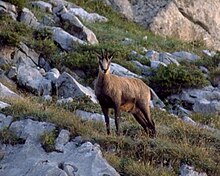
The even-toed ungulates are ungulates whose weight is borne about equally by the third and fourth toes, rather than mostly or entirely by the third as in perissodactyls. There are about 220 artiodactyl species, including many that are of great economic importance to humans.
- Family: Cervidae (deer)
- Subfamily: Cervinae
- Genus: Cervus
- Red deer, C. elaphus LC
- Genus: Dama
- European fallow deer, D. dama LC introduced
- Genus: Cervus
- Subfamily: Capreolinae
- Genus: Alces
- Eurasian elk, A. alces LC extirpated
- Genus: Capreolus
- Roe deer, C. capreolus LC
- Genus: Alces
- Subfamily: Cervinae
- Family: Bovidae (cattle, antelope, sheep, goats)
- Subfamily: Bovidae
- Genus: Bison
- European bison, B. bonasus NT reintroduced
- Genus: Bison
- Subfamily: Caprinae
- Genus: Capra
- Alpine ibex, C. ibex LC reintroduced
- Iberian ibex, C. pyrenaica LC reintroduced
- Pyrenean ibex, C. p. pyrenaica EX
- Western Spanish ibex, C. p. victoriae introduced
- Genus: Rupicapra
- Pyrenean chamois, R. pyrenaica LC
- Chamois, R. rupicapra LC
- Genus: Capra
- Subfamily: Bovidae
- Family: Suidae (pigs)
See also
- Wildlife of Metropolitan France
- List of chordate orders
- Lists of mammals by region
- Mammal classification
- List of mammals of Guadeloupe
- List of mammals of Martinique
- List of mammals of French Guiana
- List of mammals of French Polynesia
- List of mammals of Réunion
- List of mammals of Mayotte
References
- Batbold, J.; Batsaikhan, N.; Shar, S.; Hutterer, R.; Kryštufek, B.; Yigit, N.; Mitsain, G.; Palomo, L. (2016). "Castor fiber". IUCN Red List of Threatened Species. 2016: e.T4007A115067136.
- "Castor canadien (Français): Castor canadensis Kuhl, 1820". Inventaire National du Patrimoine Naturel (in French). Retrieved 15 January 2022.
- Amori, G.; Hutterer, R.; Kryštufek, B.; Yigit, N.; Mitsain, G.; Muñoz, L. J. P. (2010). "Sciurus vulgaris". IUCN Red List of Threatened Species. 2010: e.T20025A9136220.
- Bertolino, S.; Amori, G.; Henttonen, H.; Zagorodnyuk, I.; Zima, J.; Juškaitis, R.; Meinig, H. & Kryštufek, B. (2008). "Eliomys quercinus". IUCN Red List of Threatened Species. 2008: e.T7618A12835766.
- Banaszek, A.; Bogomolov, P.; Feoktistova, N.; La Haye, M.; Monecke, S.; Reiners, T. E.; Rusin, M.; Surov, A.; Weinhold, U. & Ziomek, J. (2020). "Cricetus cricetus". IUCN Red List of Threatened Species. 2020: e.T5529A111875852.
- Batsaikhan, N.; Henttonen, H.; Meinig, H.; Shenbrot, G.; Bukhnikashvili, A.; Hutterer, R.; Kryštufek, B.; Yigit, N.; Mitsain, G. & Palomo, L. (2016). "Arvicola amphibius". IUCN Red List of Threatened Species. 2016: e.T2149A115060819.
- Rigaux, P.; Vaslin, M.; Noblet, J. F.; Amori, G. & Muñoz, L. J. P. (2008). "Arvicola sapidus". IUCN Red List of Threatened Species. 2008: e.T2150A929071.
- Fernandes, M.; Pita, R.; Mira, A. (2019). "Microtus cabrerae". IUCN Red List of Threatened Species. 2019: e.T13418A90931498.
- Musser, G.; Hutterer, R.; Kryštufek, B.; Yigit, N. & Mitsain, G. (2016). "Mus musculus". IUCN Red List of Threatened Species. 2016: e.T13972A115117618.
- Kryštufek, B.; Palomo, L.J.; Hutterer, R.; Mitsain, G. & Yigit, N. (2015). "Rattus rattus". IUCN Red List of Threatened Species. 2015: e.T19360A115148682.
- Hacklande, K. & Schai-Braun, S. (2019). "Lepus europaeus". IUCN Red List of Threatened Species. 2019: e.T41280A45187424.
- Smith, A.T. & Johnston, C.H. (2019). "Lepus timidus". IUCN Red List of Threatened Species. 2019: e.T11791A45177198.
- Villafuerte, R. & Delibes-Mateos, M. (2019). "Oryctolagus cuniculus". IUCN Red List of Threatened Species. 2019: e.T41291A45189779.
- Amori, G.; Hutterer, R.; Kryštufek, B.; Yigit, N.; Mitsainas, G.; Palomo, L. (2021). "Atelerix algirus". IUCN Red List of Threatened Species. 2021: e.T27926A197498795. doi:10.2305/IUCN.UK.2021-1.RLTS.T27926A197498795.en. Retrieved 19 November 2021.
- Amori, G. (2016). "Erinaceus europaeus". IUCN Red List of Threatened Species. 2016: e.T29650A2791303.
- Hutterer, R.; Amori, G.; Krystufek, B.; Yigit, N.; Mitsain, G. & Palomo, L.J. (2010). "Crocidura suaveolens". IUCN Red List of Threatened Species. 2010: e.T29656A9511068.
- Fernandes, M.; Herrero, J.; Aulagnier, S. & Amori, G. (2008). "Galemys pyrenaicus". IUCN Red List of Threatened Species. 2008: e.T8826A12934876.
- Paunović, M. (2019). "Myotis bechsteinii". IUCN Red List of Threatened Species. 2019: e.T14123A22053752.
- Juste, J. & Paunović, M. (2016). "Myotis blythii". IUCN Red List of Threatened Species. 2016: e.T14124A22053297.
- Gazaryan, S.; Kruskop, S.V.; Godlevska, L. (2020). "Myotis brandtii". IUCN Red List of Threatened Species. 2020: e.T85566997A22054468.
- Hutson, A. M.; Spitzenberger, F.; Aulagnier, S.; Juste, J.; Karatas, A.; Palmeirim, J. & Paunovic, M. (2010). "Myotis capaccinii". IUCN Red List of Threatened Species. 2010: e.T14126A4399043.
- Piraccini, R. (2016). "Myotis dasycneme". IUCN Red List of Threatened Species. 2016: e.T14127A22055164.
- Kruskop, S.V.; Godlevska, L.; Bücs, S.; Çoraman, E. & Gazaryan, S. (2020). "daubentonii". IUCN Red List of Threatened Species. 2020: e.T85342710A22054773.
- Piraccini, R. (2016). "Myotis emarginatus". IUCN Red List of Threatened Species. 2016: e.T14129A22051191.
- Ibáñez, C. & Juste, J. (2017). "Myotis escalerai". IUCN Red List of Threatened Species. 2017: e.T85733126A85733299.
- Coroiu, I.; Juste, J. & Paunović, M. (2016). "Myotis myotis". IUCN Red List of Threatened Species. 2016: e.T14133A22051759.
- Coroiu, I. (2016). "Myotis mystacinus". IUCN Red List of Threatened Species. 2016: e.T14134A22052250.
- Gazaryan, S.; Kruskop, S.V. & Godlevska, L. (2020). "Myotis nattereri". IUCN Red List of Threatened Species. 2020: e.T85733032A22052584.
- Piraccini, R. (2016). "Barbastella barbastellus". IUCN Red List of Threatened Species. 2016: e.T2553A22029285.
- Hutson, A. M.; Spitzenberger, F.; Juste, J.; Aulagnier, S.; Palmeirim, J.; Paunovic, M. & Karatas, A. (2010). "Hypsugo savii". IUCN Red List of Threatened Species. 2010: e.T44856A10955205.
- Hutson, A. M.; Alcaldé, J. T.; Juste, J.; Karataş, A.; Palmeirim, J. & Paunović, M. (2010). "Nyctalus lasiopterus". IUCN Red List of Threatened Species. 2010: e.T14918A4471682.
- Juste, J. & Paunović, M. (2016). "Nyctalus leisleri". IUCN Red List of Threatened Species. 2016: e.T14919A22016159.
- Csorba, G. & Hutson, A.M. (2016). "Nyctalus noctula". IUCN Red List of Threatened Species. 2016: e.T14920A22015682.
- Hutson, A. M.; Spitzenberger, F.; Juste, J.; Aulagnier, S.; Palmeirim, J.; Karatas, A. & Paunovic, M. (2010). "Pipistrellus nathusii". IUCN Red List of Threatened Species. 2010: e.T17316A6966886.
- Gazaryan, S.; Kruskop, S.V. & Godlevska, L. (2021) . "Plecotus auritus". IUCN Red List of Threatened Species. 2020: e.T85535522A195861341.
- Gazaryan, S. & Godlevska, L. (2020) . "Plecotus austriacus". IUCN Red List of Threatened Species. 2020: e.T85533333A195862345.
- Gazaryan, S.; Bücs, S. & Çoraman, E. (2020). "Miniopterus schreibersii". IUCN Red List of Threatened Species. 2020: e.T81633057A151216401.
- Benda, P. & Piraccini, R. (2016). "Tadarida teniotis". IUCN Red List of Threatened Species. 2016: e.T21311A22114995.
- Juste, J. & Alcaldé, J. (2016). "Rhinolophus euryale". IUCN Red List of Threatened Species. 2016: e.T19516A21971185.
- Piraccini, R. (2016). "Rhinolophus ferrumequinum". IUCN Red List of Threatened Species. 2016: e.T19517A21973253.
- Taylor, P. (2016). "Rhinolophus hipposideros". IUCN Red List of Threatened Species. 2016: e.T19518A21972794.
- Alcaldé, J.; Benda, P. & Juste, J. (2016). "Rhinolophus mehelyi". IUCN Red List of Threatened Species. 2016: e.T19519A21974380.
- "Bénodet. Un cétacé en goguette devant la grande plage". 10 May 2016. Retrieved 5 July 2016.
- "Rare arctic bowhead whale seen off Cornwall - BBC News". BBC News. 16 May 2016. Retrieved 5 July 2016.
- "Bénodet. Un cétacé repéré près de la plage du Trez". 9 May 2016. Retrieved 5 July 2016.
- Reeves, R.; Pitman, R.L. & Ford, J.K.B. (2017). "Orcinus orca". IUCN Red List of Threatened Species. 2017: e.T15421A50368125.
- Gerngross, P.; Ambarli, H.; Angelici, F.M.; Anile, S.; Campbell, R.; Ferreras de Andres, P.; Gil-Sanchez, J.M.; Götz, M.; Jerosch, S.; Mengüllüoglu, D.; Monterosso, P. & Zlatanova, D. (2022). "Felis silvestris". IUCN Red List of Threatened Species. 2022: e.T181049859A181050999. doi:10.2305/IUCN.UK.2022-1.RLTS.T181049859A181050999.en. Retrieved 3 August 2022.
- Breitenmoser, U.; Breitenmoser-Würsten, C.; Lanz, T.; von Arx, M.; Antonevich, A.; Bao, W. & Avgan, B. (2015). "Lynx lynx". IUCN Red List of Threatened Species. 2015: e.T12519A121707666.
- Rodríguez, A. & Calzada, J. (2015). "Lynx pardinus". IUCN Red List of Threatened Species. 2015: e.T12520A50655794.
- Gaubert, P.; Carvalho, F.; Camps, D. & Do Linh San, E. (2015). "Genetta genetta". IUCN Red List of Threatened Species. 2015: e.T41698A45218636.
- Hoffmann, M.; Arnold, J.; Duckworth, J. W.; Jhala, Y.; Kamler, J. F. & Krofel, M. (2018). "Canis aureus". IUCN Red List of Threatened Species. 2018: e.T118264161A46194820.
- Lichfield, John (16 September 2021). "OPINION: 24 years after I first reported on wolves in France, they are at my door in Normandy". The Local fr. Retrieved 18 September 2021.
- Boitani, L.; Phillips, M. & Jhala, Y. (2018). "Canis lupus". IUCN Red List of Threatened Species. 2018: e.T3746A119623865.
- Kauhala, K. & Saeki, M. (2016). "Nyctereutes procyonoides". IUCN Red List of Threatened Species. 2016: e.T14925A85658776.
- Hoffmann, M. & Sillero-Zubiri, C. (2016). "Vulpes vulpes". IUCN Red List of Threatened Species. 2016: e.T23062A46190249.
- McLellan, B. N.; Proctor, M. F.; Huber, D. & Michel, S. (2017). "Ursus arctos". IUCN Red List of Threatened Species. 2017: e.T41688A121229971.
- Roos, A.; Loy, A.; de Silva, P.; Hajkova, P. & Zemanová, B. (2015). "Lutra lutra". IUCN Red List of Threatened Species. 2015: e.T12419A21935287.
- Abramov, A.V.; Kranz, A.; Herrero, J.; Krantz, A.; Choudhury, A. & Maran, T. (2016). "Martes foina". IUCN Red List of Threatened Species. 2016: e.T29672A45202514.
- Herrero, J.; Kranz, A.; Skumatov, D.; Abramov, A.V.; Maran, T. & Monakhov, V.G. (2016). "Martes martes". IUCN Red List of Threatened Species. 2016: e.T12848A45199169.
- Kranz, A.; Abramov, A. V.; Herrero, J. & Maran, T. (2016). "Meles meles". IUCN Red List of Threatened Species. 2016: e.T29673A45203002.
- Reid, F.; Helgen, K. & Kranz, A. (2016). "Mustela erminea". IUCN Red List of Threatened Species. 2016: e.T29674A45203335.
- Maran, T.; Aulagnier, S.; Libois, R.; Kranz, A.; Abramov, A. & Wozencraft, C. (2010). "Mustela lutreola". IUCN Red List of Threatened Species. 2010: e.T14018A4381596.
- McDonald, R. A.; Abramov, A. V.; Stubbe, M.; Herrero, J.; Maran, T.; Tikhonov, A.; Cavallini, P.; Kranz, A.; Giannatos, G.; Kryštufek, B. & Reid, F. (2019). "Mustela nivalis". IUCN Red List of Threatened Species. 2019: e.T70207409A147993366.
- Skumatov, D.; Abramov, A.V.; Herrero, J.; Kitchener, A.; Maran, T.; Kranz, A.; Sándor, A.; Stubbe, M.; Saveljev, A.; Savour-Soubelet, A.; Guinot-Ghestem, M.; Zuberogoitia, I.; Birks, J.D.S.; Weber, A.; Melisch, R. & Ruette, S. (2016). "Mustela putorius". IUCN Red List of Threatened Species. 2016: e.T41658A45214384.
- Reid, F.; Schiaffini, M.; Schipper, J. (2016). "Neovison vison". IUCN Red List of Threatened Species. 2016: e.T41661A45214988.
- Karamanlidis, A. & Dendrinos, P. (2015). "Monachus monachus". IUCN Red List of Threatened Species. 2015: e.T13653A45227543.
- Lovari, S.; Lorenzini, R.; Masseti, M.; Pereladova, O.; Carden, R.F.; Brook, S.M. & Mattioli, S. (2018). "Cervus elaphus". IUCN Red List of Threatened Species. 2018: e.T55997072A142404453.
- Masseti, M. & Mertzanidou, D. (2008). "Dama dama". IUCN Red List of Threatened Species. 2008: e.T42188A10656554.
- Schmölcke, U.; Zachos, F. E. (16 November 2005). "Holocene distribution and extinction of the moose (Alces alces, Cervidae) in Central Europe". Mammalian Biology. 70 (6): 329–344. Bibcode:2005MamBi..70..329S. doi:10.1016/j.mambio.2005.08.001.
- Lovari, S.; Herrero, J.; Masseti, M.; Ambarli, H.; Lorenzini, R. & Giannatos, G. (2016). "Capreolus capreolus". IUCN Red List of Threatened Species. 2016: e.T42395A22161386.
- European Bison (Bison bonasus): Current State of the Species and Strategy for Its Conservation By Zdzsław Pucek, Published by Council of Europe, 2004, ISBN 92-871-5549-6, 978-92-871-5549-8
- Toïgo, C.; Brambilla, A.; Grignolio, S.; Pedrotti, L. (2020). "Capra ibex". IUCN Red List of Threatened Species. 2020: e.T42397A161916377. doi:10.2305/IUCN.UK.2020-2.RLTS.T42397A161916377.en. Retrieved 19 November 2021.
- "Ibex population thrives in French Pyrenees a century after being wiped out". The Guardian. Agence France-Presse. 3 September 2020. Retrieved 6 May 2021.
- Herrero, J.; Lovari, S.; Nores, C. & Toigo, C. (2020). "Rupicapra pyrenaica". IUCN Red List of Threatened Species. 2020: e.T19771A171131310.
- Aulagnier, S.; Giannatos, G. & Herrero, J. (2008). "Rupicapra rupicapra". IUCN Red List of Threatened Species. 2008: e.T39255A10179647.
- Keuling, O. & Leus, K. (2019). "Sus scrofa". IUCN Red List of Threatened Species. 2019: e.T41775A44141833.
External links
- "Animal Diversity Web". University of Michigan Museum of Zoology. 1995–2006. Retrieved 22 May 2007.
| List of mammals of Europe | |
|---|---|
| Sovereign states |
|
| States with limited recognition | |
| Dependencies and other entities | |